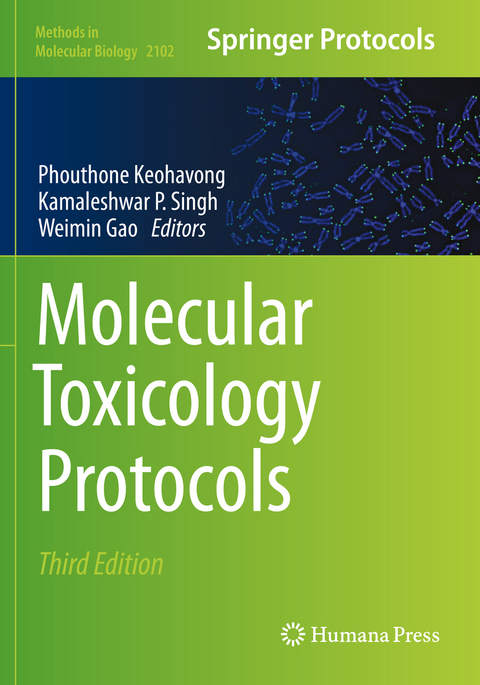
Molecular Toxicology Protocols
Springer-Verlag New York Inc.
978-1-0716-0225-6 (ISBN)
Comprehensive and up-to-date, Molecular Toxicology Protocols, Third Edition will prove to play an important role in generating a better understanding of the field of toxicology and its sub-disciplines.
Bioenergetic Analyses of In Vitro and In Vivo Samples to Guide Toxicological Endpoints.- Next Generation Sequencing (NGS) Application in Multi-Parameter Gene Expression Analysis.- Integrated Chip-Seq and RNA-Seq Data Analysis Coupled with Bioinformatics Approaches to Investigate Regulatory Landscape of Transcription Modulators in Breast Cancer Cells.- Analysis of RNA Sequencing Data using CLC Genomics Workbench.- Using Bronchoalveolar Lavage to Evaluate Changes in Pulmonary Diseases.- Fast and Efficient Measurement of Clinical and Biological Samples Using Immunoassay-Based Multiplexing Systems.- Induction of Lung Tumors and Mutational Analysis in FVB/N Mice Treated with the Tobacco Carcinogen 4-(Methylnitrosamino)-1-(3-pyridyl)-1-Butanone.- Two-Dimensional Difference Gel Electrophoresis: A Gel-Based Proteomic Approach for Protein Analysis.- Determination and Quantification of Bacterial Virulent Gene Expression Using Quantitative Real Time PCR.- Using a Lentivirus-Based Inducible RNAi Vector to Silence a Gene.- Analysis of Toxicants-Induced Alterations in DNA Methylation by Methylation-Sensitive Random Amplified Polymorphic DNA-Polymerase Chain Reaction (MS-RAPD-PCR).- Detection of DNA Methylation by MeDIP and MBDCap Assays: An Overview of Techniques.- Analysis of Telomere Length and Aberrations by Quantitative FISH.- Detection of Loss of Heterozygosity in Tk-Deficient Mutants from L5178Y Tk+/–-3.7.2C Mouse Lymphoma Cells.- Detection of DNA Double-Strand Breaks and Chromosome Translocations Using Ligation-Mediated PCR and Inverse PCR.- 32P-Postlabeling Analysis of DNA Adducts.- Determination of Mutational Spectra Induced by Environmental Toxicants in Complex Human Cell Populations.- Detection of Pig-a Mutant Erythrocytes in the Peripheral Blood of Rats and Mice.- Analysis of In Vivo Mutation in the Hprt and Tk Genes of Mouse Lymphocytes.- Molecular Analysis of Mutations in the Human HPRT Gene.- Simultaneous Quantification of t(14;18) and HPRT Exon 2/3 Deletions In Human Lymphocytes.- Analysis of Mutations in K-ras and p53 Genes in Sputum and Plasma Samples.- ACB-PCR Quantification of Low-Frequency Hotspot Cancer-Driver Mutations.- Detection and Characterization of Oncogene Mutations in Preneoplastic and Early Neoplastic Lesions.- The Sister Chromatid Exchange (SCE) Assay.- The Gene Cluster Instability (GCI) Assay for Recombination.- New Perspectives on Unscheduled DNA Synthesis: Functional Assay for Global Genomic DNA Nucleotide Excision Repair.- Host Cell Reactivation: Assay for Actively Transcribed DNA Nucleotide Excision Repair Using Luciferase Family Expression Vectors.- Methods for Establishing and Using a Stable Cell Line Expressing Both Gaussia Luciferase and Firefly Luciferase to Screen for Endoplasmic Reticulum Stress.- FREMSA: A Method That Provides Direct Evidence of the Interaction Between MicroRNA and mRNA.
| Erscheinungsdatum | 29.01.2021 |
|---|---|
| Reihe/Serie | Methods in Molecular Biology ; 2102 |
| Zusatzinfo | 144 Illustrations, color; 39 Illustrations, black and white; XIV, 576 p. 183 illus., 144 illus. in color. |
| Verlagsort | New York, NY |
| Sprache | englisch |
| Maße | 178 x 254 mm |
| Themenwelt | Medizin / Pharmazie ► Medizinische Fachgebiete ► Pharmakologie / Pharmakotherapie |
| Medizin / Pharmazie ► Pharmazie | |
| Studium ► 2. Studienabschnitt (Klinik) ► Humangenetik | |
| Studium ► 2. Studienabschnitt (Klinik) ► Pharmakologie / Toxikologie | |
| Naturwissenschaften ► Biologie ► Genetik / Molekularbiologie | |
| Schlagworte | Bioinformatics • DNA Damage • gene mutation • Genetic toxicology of cancer • Next-generation sequencing • Toxins and toxicants |
| ISBN-10 | 1-0716-0225-X / 107160225X |
| ISBN-13 | 978-1-0716-0225-6 / 9781071602256 |
| Zustand | Neuware |
| Informationen gemäß Produktsicherheitsverordnung (GPSR) | |
| Haben Sie eine Frage zum Produkt? |
aus dem Bereich


